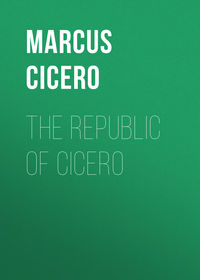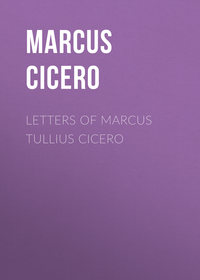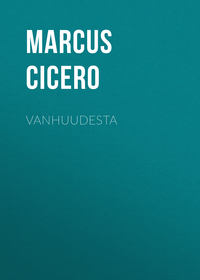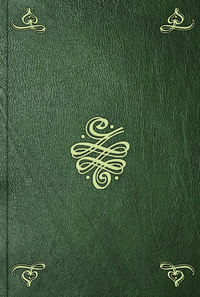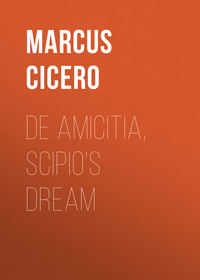 полная версия
полная версияCicero's Tusculan Disputations
6
So Horace joins these two classes as inventors of all kinds of improbable fictions:
Pictoribus atque poetis
Quidlibet audendi semper fuit æqua potestas.—A. P. 9.Which Roscommon translates:
Painters and poets have been still allow’dTheir pencil and their fancies unconfined.7
Epicharmus was a native of Cos, but lived at Megara, in Sicily, and when Megara was destroyed, removed to Syracuse, and lived at the court of Hiero, where he became the first writer of comedies, so that Horace ascribes the invention of comedy to him, and so does Theocritus. He lived to a great age.
8
Pherecydes was a native of Scyros, one of the Cyclades; and is said to have obtained his knowledge from the secret books of the Phœnicians. He is said also to have been a pupil of Pittacus, the rival of Thales, and the master of Pythagoras. His doctrine was that there were three principles (Ζεὺς, or Æther; Χθὼν, or Chaos; and Χρόνος, or Time) and four elements (Fire, Earth, Air, and Water), from which everything that exists was formed.—Vide Smith’s Dict. Gr. and Rom. Biog.
9
Archytas was a native of Tarentum, and is said to have saved the life of Plato by his influence with the tyrant Dionysius. He was especially great as a mathematician and geometrician, so that Horace calls him
Maris et terra numeroque carentis arenæMensorem.Od. i. 28.1.Plato is supposed to have learned some of his views from him, and Aristotle to have borrowed from him every idea of the Categories.
10
This was not Timæus the historian, but a native of Locri, who is said also in the De Finibus (c. 29) to have been a teacher of Plato. There is a treatise extant bearing his name, which is, however, probably spurious, and only an abridgment of Plato’s dialogue Timæus.
11
Dicæarchus was a native of Messana, in Sicily, though he lived chiefly in Greece. He was one of the later disciples of Aristotle. He was a great geographer, politician, historian, and philosopher, and died about 285 b.c.
12
Aristoxenus was a native of Tarentum, and also a pupil of Aristotle. We know nothing of his opinions except that he held the soul to be a harmony of the body; a doctrine which had been already discussed by Plato in the Phædo, and combated by Aristotle. He was a great musician, and the chief portions of his works which have come down to us are fragments of some musical treatises.—Smith’s Dict. Gr. and Rom. Biog.; to which source I must acknowledge my obligation for nearly the whole of these biographical notes.
13
The Simonides here meant is the celebrated poet of Ceos, the perfecter of elegiac poetry among the Greeks. He flourished about the time of the Persian war. Besides his poetry, he is said to have been the inventor of some method of aiding the memory. He died at the court of Hiero, 467 b.c.
14
Theodectes was a native of Phaselis, in Pamphylia, a distinguished rhetorician and tragic poet, and flourished in the time of Philip of Macedon. He was a pupil of Isocrates, and lived at Athens, and died there at the age of forty-one.
15
Cineas was a Thessalian, and (as is said in the text) came to Rome as ambassador from Pyrrhus after the battle of Heraclea, 280 b.c., and his memory is said to have been so great that on the day after his arrival he was able to address all the senators and knights by name. He probably died before Pyrrhus returned to Italy, 276 b.c.
16
Charmadas, called also Charmides, was a fellow-pupil with Philo, the Larissæan of Clitomachus, the Carthaginian. He is said by some authors to have founded a fourth academy.
17
Metrodorus was a minister of Mithridates the Great; and employed by him as supreme judge in Pontus, and afterward as an ambassador. Cicero speaks of him in other places (De Orat. ii. 88) as a man of wonderful memory.
18
Quintus Hortensius was eight years older than Cicero; and, till Cicero’s fame surpassed his, he was accounted the most eloquent of all the Romans. He was Verres’s counsel in the prosecution conducted against him by Cicero. Seneca relates that his memory was so great that he could come out of an auction and repeat the catalogue backward. He died 50 b.c.
19
This treatise is one which has not come down to us, but which had been lately composed by Cicero in order to comfort himself for the loss of his daughter.
20
The epigram is,
Εἴπας Ἥλιε χαῖρε, Κλεόμβροτος Ὥμβρακιώτηςἥλατ’ ἀφ’ ὑψηλοῦ τείχεος εἰς Ἀΐδην,ἄξιον οὐδὲν ἰδὼν θανάτου κακὸν, ἀλλὰ Πλάτωνοςἓν τὸ περὶ ψύχης γράμμ’ ἀναλεξάμενος.Which may be translated, perhaps,
Farewell, O sun, Cleombrotus exclaim’d,Then plunged from off a height beneath the sea;Stung by pain, of no disgrace ashamed,But moved by Plato’s high philosophy.21
This is alluded to by Juvenal:
Provida Pompeio dederat Campania febresOptandas: sed multæ urbes et publica votaVicerunt. Igitur Fortuna ipsius et Urbis,Servatum victo caput abstulit.—Sat. x. 283.22
Pompey’s second wife was Julia, the daughter of Julius Cæsar, she died the year before the death of Crassus, in Parthia. Virgil speaks of Cæsar and Pompey as relations, using the same expression (socer) as Cicero:
Aggeribus socer Alpinis atque arce MonœciDescendens, gener adversis instructus Eois.—Æn. vi. 830.23
This idea is beautifully expanded by Byron:
Yet if, as holiest men have deem’d, there beA land of souls beyond that sable shoreTo shame the doctrine of the SadduceeAnd sophist, madly vain or dubious lore,How sweet it were in concert to adoreWith those who made our mortal labors light,To hear each voice we fear’d to hear no more.Behold each mighty shade reveal’d to sight,The Bactrian, Samian sage, and all who taught the right! Childe Harold, ii.24
The epitaph in the original is:
Ὦ ξεῖν’ ἀγγεῖλον Λακεδαιμονίοις ὅτι τῇδεκείμεθα, τοῐς κείνων πειθόμενοι νομίμοις.25
This was expressed in the Greek verses,
Ἀρχὴς μὲν μὴ φῦναι ἐπιχθονίοισιν ἄριστον,φύντα δ’ ὅπως ὤκιστα πύλας Ἀΐδϋο περῆσαιwhich by some authors are attributed to Homer.
26
This is the first fragment of the Cresphontes.—Ed. Var. vii., p. 594.
Ἔδει γὰρ ἡμᾶς σύλλογον ποιουμένουςΤὸν φύντα θρηνεῖν, εἰς ὅσ’ ἔρχεται κακά.Τὸν δ’ αὖ θανόντα καὶ πόνων πεπαυμένονχαίροντας εὐφημοῖντας ἐκπέμειν δόμων27
The Greek verses are quoted by Plutarch:
Ἤπου νήπιε, ἠλίθιοι φρένες ἀνδρῶνΕὐθύνοος κεῖται μοιριδίῳ θανάτῳΟὐκ ἠν γὰρ ζώειν καλὸν αὐτῷ οὔτε γονεῦσι.28
This refers to the story that when Eumolpus, the son of Neptune, whose assistance the Eleusinians had called in against the Athenians, had been slain by the Athenians, an oracle demanded the sacrifice of one of the daughters of Erechtheus, the King of Athens. And when one was drawn by lot, the others voluntarily accompanied her to death.
29
Menœceus was son of Creon, and in the war of the Argives against Thebes, Teresias declared that the Thebans should conquer if Menœceus would sacrifice himself for his country; and accordingly he killed himself outside the gates of Thebes.
30
The Greek is,
μήδε μοι ἄκλαυστος θάνατος μόλοι, ἀλλὰ φίλοισιποιήσαιμι θανὼν ἄλγεα καὶ στοναχάς.31
Soph. Trach. 1047.
32
The lines quoted by Cicero here appear to have come from the Latin play of Prometheus by Accius; the ideas are borrowed, rather than translated, from the Prometheus of Æschylus.
33
From exerceo.
34
Each soldier carried a stake, to help form a palisade in front of the camp.
35
Insania—from in, a particle of negative force in composition, and sanus, healthy, sound.
36
The man who first received this surname was L. Calpurnius Piso, who was consul, 133 b.c., in the Servile War.
37
The Greek is,
Ἀλλά μοι οἰδάνεται κραδίη χόλῳ ὅπποτ’ ἐκείνουΜνήσομαι ὅς μ’ ἀσύφηλον ἐν Ἀργείοισιν ἔρεξεν.—Il. ix. 642.I have given Pope’s translation in the text.
38
This is from the Theseus:
Ἐγὼ δὲ τοῦτο παρὰ σοφοῦ τινος μαθὼνεὶς φροντίδας νοῦν συμφοράς τ’ ἐβαλλόμηνφυγάς τ’ ἐμαυτῷ προστιθεὶς πάτρας ἐμῆς.θανάτους τ’ ἀώρους, καὶ κακῶν ἄλλας ὁδοὺςὡς, εἴ τι πάσχοιμ’ ὠν ἐδόξαζόν ποτεΜή μοι νέορτον προσπεσὸν μᾶλλον δάκοι.39
Ter. Phorm. II. i. 11.
40
This refers to the speech of Agamemnon in Euripides, in the Iphigenia in Aulis,
Ζηλῶ σε, γέρον,ζηλῶ δ’ ἀνδρῶν ὃς ἀκίνδυνονβίον ἐξεπέρασ’, ἀγνὼς, ἀκλεής.—v. 15.41
This is a fragment from the Hypsipyle:
Εφυ μὲν οὐδεὶς ὅστις οὐ πονεῖ βροτῶνθάπτει τε τέκνα χἄτερ’ αὖ κτᾶται νεὰ,αὐτός τε θνήσκει. καὶ τάδ’ ἄχθονται βροτοὶεἰς γῆν φέροντες γῆν ἀναγκαίως δ’ ἔχειβίον θερίζειν ὥστε κάρπιμον στάχυν.42
Πολλὰς ἐκ κεφαλῆς προθελύμνους ἕλκετο χαίτας.—Il. x. 15.43
Ἤτοι ὁ καππέδιον τὸ Ἀληΐον οἶος ἀλᾶτοὅν θυμὸν κατεδὼν, πάτον ἀνθρώπων ἀλεείνων.—Il. vi. 201.44
This is a translation from Euripides:
Ὥσθ’ ἵμερος μ’ ὑπῆλθε γῇ τε κ’ οὐρανῷλέξαι μολούσῃ δεῦρο Μηδείας τύχας.—Med. 57.45
Λίην γὰρ πολλοὶ καὶ ἐπήτριμοι ἤματα πάνταπίπτουσιν, πότε κέν τις ἀναπνεύσειε πόνοιο;ἀλλὰ χρὴ τὸν μὲν καταθαπτέμεν, ὅς κε θάνησι,νηλέα θυμὸν ἔχοντας, ἔπ’ ἤματι δακρυσάντας.—Hom. Il. xix. 226.46
This is one of the fragments of Euripides which we are unable to assign to any play in particular; it occurs Var. Ed. Tr. Inc. 167.
Εἰ μεν τόδ’ ἦμαρ πρῶτον ἦν κακουμένῳκαὶ μὴ μακρὰν δὴ διὰ πόνων ἐναυστόλουνεἰκὸς σφαδάζειν ἦν ἂν, ὡς νεόζυγαπῶλον, χάλινον ἀρτίως δεδεγμένοννῦν δ’ ἀμβλύς εἰμι, καὶ κατηρτυκὼς κακῶν.47
This is only a fragment, preserved by Stobæus:
Τοὺς δ’ ἂν μεγίστους καὶ σοφωτάτους φρενὶτοιούσδ’ ἴδοις ἂν, οἶός ἐστι νῦν ὅδε,καλῶς κακῶς πράσσοντι συμπαραινέσαιὅταν δὲ δαίμων ἀνδρὸς εὐτυχοῦς τὸ πρὶνμάστιγ’ ἐπίσῃ τοῦ βίου παλίντροπον,τὰ πολλὰ φροῦδα καὶ κακῶς εἰρημένα.48
Ωκ. Οὐκοῦν Προμηθεῦ τοῦτο γιγνώσκεις ὅτιὀργῆς νοσούσης εἰσὶν ἰατροὶ λόγοι.Πρ. ἐάν τις ἐν καιρῷ γε μαλθάσσῃ κεάρκαὶ μὴ σφριγῶντα θυμὸν ἰσχναίνη βιᾳ.—Æsch. Prom. v. 378.49
Cicero alludes here to Il. vii. 211, which is thus translated by Pope:
His massy javelin quivering in his hand,He stood the bulwark of the Grecian band;Through every Argive heart new transport ran,All Troy stood trembling at the mighty man:E’en Hector paused, and with new doubt oppress’d,Felt his great heart suspended in his breast;’Twas vain to seek retreat, and vain to fear,Himself had challenged, and the foe drew near.But Melmoth (Note on the Familiar Letters of Cicero, book ii. Let. 23) rightly accuses Cicero of having misunderstood Homer, who “by no means represents Hector as being thus totally dismayed at the approach of his adversary; and, indeed, it would have been inconsistent with the general character of that hero to have described him under such circumstances of terror.”
Τὸν δὲ καὶ Ἀργεῖοι μέγ’ ἐγήθεον εἰσορόωντες,Τρωὰς δὲ τρόμος αἶνος ὑπήλυθε γυῖα ἕκαστον,Ἕκτορι δ’ αὐτῷ θυμὸς ἐνὶ στήθεσσι πάτασσεν.But there is a great difference, as Dr. Clarke remarks, between θυμὸς ἐνὶ στήθεσσι πάτασσεν and καρδέη ἔξω στηθέων ἔθρωσκεν, or τρόμος αἶνος ὑπήλυθε γυῖα.—The Trojans, says Homer, trembled at the sight of Ajax, and even Hector himself felt some emotion in his breast.
50
Cicero means Scipio Nasica, who, in the riots consequent on the reelection of Tiberius Gracchus to the tribunate, 133 b.c., having called in vain on the consul, Mucius Scævola, to save the republic, attacked Gracchus himself, who was slain in the tumult.
51
Morosus is evidently derived from mores—“Morosus, mos, stubbornness, self-will, etc.”—Riddle and Arnold, Lat. Dict.
52
In the original they run thus:
Οὔκ ἐστιν οὐδὲν δεινὸν ὧδ’ εἰπεῖν ἔπος,Οὐδὲ πάθος, οὐδὲ ξυμφορὰ θεήλατοςἧς οὐκ ἂν ἀροιτ’ ἄχθος ἀνθρώπον φύσις.53
This passage is from the Eunuch of Terence, act i., sc. 1, 14.
54
These verses are from the Atreus of Accius.
55
This was Marcus Atilius Regulus, the story of whose treatment by the Carthaginians in the first Punic War is well known to everybody.
56
This was Quintus Servilius Cæpio, who, 105 b.c., was destroyed, with his army, by the Cimbri, it was believed as a judgment for the covetousness which he had displayed in the plunder of Tolosa.
57
This was Marcus Aquilius, who, in the year 88 b.c., was sent against Mithridates as one of the consular legates; and, being defeated, was delivered up to the king by the inhabitants of Mitylene. Mithridates put him to death by pouring molten gold down his throat.
58
This was the elder brother of the triumvir Marcus Crassus, 87 b.c. He was put to death by Fimbria, who was in command of some of the troops of Marius.
59
Lucius Cæsar and Caius Cæsar were relations (it is uncertain in what degree) of the great Cæsar, and were killed by Fimbria on the same occasion as Octavius.
60
M. Antonius was the grandfather of the triumvir; he was murdered the same year, 87 b.c., by Annius, when Marius and Cinna took Rome.
61
This story is alluded to by Horace:
Districtus ensis cui super impiâCervice pendet non Siculæ dapesDulcem elaborabunt saporem,Non avium citharæve cantusSomnum reducent.—iii. 1. 17.62
Hieronymus was a Rhodian, and a pupil of Aristotle, flourishing about 300 b.c. He is frequently mentioned by Cicero.
63
We know very little of Dinomachus. Some MSS. have Clitomachus.
64
Callipho was in all probability a pupil of Epicurus, but we have no certain information about him.
65
Diodorus was a Syrian, and succeeded Critolaus as the head of the Peripatetic School at Athens.
66
Aristo was a native of Ceos, and a pupil of Lycon, who succeeded Straton as the head of the Peripatetic School, 270 b.c. He afterward himself succeeded Lycon.
67
Pyrrho was a native of Elis, and the originator of the sceptical theories of some of the ancient philosophers. He was a contemporary of Alexander.
68
Herillus was a disciple of Zeno of Cittium, and therefore a Stoic. He did not, however, follow all the opinions of his master: he held that knowledge was the chief good. Some of the treatises of Cleanthes were written expressly to confute him.
69
Anacharsis was (Herod., iv., 76) son of Gnurus and brother of Saulius, King of Thrace. He came to Athens while Solon was occupied in framing laws for his people; and by the simplicity of his way of living, and his acute observations on the manners of the Greeks, he excited such general admiration that he was reckoned by some writers among the Seven Wise Men of Greece.
70
This was Appius Claudius Cæcus, who was censor 310 b.c., and who, according to Livy, was afflicted with blindness by the Gods for persuading the Potitii to instruct the public servants in the way of sacrificing to Hercules. He it was who made the Via Appia.
71
The fact of Homer’s blindness rests on a passage in the Hymn to Apollo, quoted by Thucydides as a genuine work of Homer, and which is thus spoken of by one of the most accomplished scholars that this country or this age has ever produced: “They are indeed beautiful verses; and if none worse had ever been attributed to Homer, the Prince of Poets would have had little reason to complain.
“He has been describing the Delian festival in honor of Apollo and Diana, and concludes this part of the poem with an address to the women of that island, to whom it is to be supposed that he had become familiarly known by his frequent recitations:
Χαίρετε δ’ ὑμεῖς πᾶσαι, ἐμεῖο δὲ καὶ μετόπισθεμνήσασθ’, ὅπποτέ κέν τις ἐπιχθονίων ἀνθρώπωνἐνθάδ’ ἀνείρηται ξεῖνος ταλαπείριος ἐλθὼνὦ κοῦραι, τίς δ’ ὕμμιν ἀνὴρ ἥδιστος ἀοιδῶνἐνθάδε πωλεῖται καὶ τέῳ τέρπεσθε μάλιστα;ὑμεῖς δ’ εὖ μάλα πᾶσαι ὑποκρίνασθε ἀφ’ ἡμῶν,Τυφλὸς ἀνὴρ, οἰκεῖ δὲ Χίῳ ἐνὶ παιπαλοέσσῃ,τοῦ πᾶσαι μετόπισθεν ἀριστεύουσιν ἀοιδαί.Virgins, farewell—and oh! remember meHereafter, when some stranger from the sea,A hapless wanderer, may your isle explore,And ask you, ‘Maids, of all the bards you boast,Who sings the sweetest, and delights you most?’Oh! answer all, ‘A blind old man, and poor,Sweetest he sings, and dwells on Chios’ rocky shore.’”Coleridge’s Introduction to the Study of the Greek Classic Poets.
72
Some read scientiam and some inscientiam; the latter of which is preferred by some of the best editors and commentators.
73
For a short account of these ancient Greek philosophers, see the sketch prefixed to the Academics (Classical Library).
74
Cicero wrote his philosophical works in the last three years of his life. When he wrote this piece, he was in the sixty-third year of his age, in the year of Rome 709.
75
The Academic.
76
Diodorus and Posidonius were Stoics; Philo and Antiochus were Academics; but the latter afterward inclined to the doctrine of the Stoics.
77
Julius Cæsar.
78
Cicero was one of the College of Augurs.
79
The Latinæ Feriæ was originally a festival of the Latins, altered by Tarquinius Superbus into a Roman one. It was held in the Alban Mount, in honor of Jupiter Latiaris. This holiday lasted six days: it was not held at any fixed time; but the consul was never allowed to take the field till he had held them.—Vide Smith, Dict. Gr. and Rom. Ant., p. 414.
80
Exhedra, the word used by Cicero, means a study, or place where disputes were held.
81
M. Piso was a Peripatetic. The four great sects were the Stoics, the Peripatetics, the Academics, and the Epicureans.
82
It was a prevailing tenet of the Academics that there is no certain knowledge.
83
The five forms of Plato are these: οὐσία, ταὐτὸν, ἕτερον, στάσις, κίνησις.
84
The four natures here to be understood are the four elements—fire, water, air, and earth; which are mentioned as the four principles of Empedocles by Diogenes Laertius.
85
These five moving stars are Saturn, Jupiter, Mars, Mercury, and Venus. Their revolutions are considered in the next book.
86
Or, Generation of the Gods.
87
The πρόληψις of Epicurus, before mentioned, is what he here means.
88
Στερέμνια is the word which Epicurus used to distinguish between those objects which are perceptible to sense, and those which are imperceptible; as the essence of the Divine Being, and the various operations of the divine power.
89
Zeno here mentioned is not the same that Cotta spoke of before. This was the founder of the Stoics. The other was an Epicurean philosopher whom he had heard at Athens.
——πατὴρ ἀνδρῶν τε θεῶν τε,and has been used by Virgil and other poets since Ennius.
——Terram fumare calentem.
Horace says exactly the same thing:
Hâc arte Pollux et vagus HerculesEnisus arces attigit igneas:Quos inter Augustus recumbensPurpureo bibit ore nectar.Hâc te merentem, Bacche pater, tuæVexere tigres indocili jugumCollo ferentes: hâc QuirinusMartis equis Acheronta fugit.—Hor. iii. 3. 9.Thou that mak’st a day of night,Goddess excellently bright.—Ode to the Moon.90
That is, there would be the same uncertainty in heaven as is among the Academics.
91
Those nations which were neither Greek nor Roman.
92
Sigilla numerantes is the common reading; but P. Manucius proposes venerantes, which I choose as the better of the two, and in which sense I have translated it.
93
Fundamental doctrines.
94
That is, the zodiac.
95
The moon, as well as the sun, is indeed in the zodiac, but she does not measure the same course in a month. She moves in another line of the zodiac nearer the earth.
96
According to the doctrines of Epicurus, none of these bodies themselves are clearly seen, but simulacra ex corporibus effluentia.
97
Epicurus taught his disciples in a garden.
98
By the word Deus, as often used by our author, we are to understand all the Gods in that theology then treated of, and not a single personal Deity.
99
The best commentators on this passage agree that Cicero does not mean that Aristotle affirmed that there was no such person as Orpheus, but that there was no such poet, and that the verse called Orphic was said to be the invention of another. The passage of Aristotle to which Cicero here alludes has, as Dr. Davis observes, been long lost.
100
A just proportion between the different sorts of beings.
101
Some give quos non pudeat earum Epicuri vocum; but the best copies have not non; nor would it be consistent with Cotta to say quos non pudeat, for he throughout represents Velleius as a perfect Epicurean in every article.
102
His country was Abdera, the natives of which were remarkable for their stupidity.
103
This passage will not admit of a translation answerable to the sense of the original. Cicero says the word amicitia (friendship) is derived from amor (love or affection).
104
This manner of speaking of Jupiter frequently occurs in Homer,
105
Perses, or Perseus, the last king of Macedonia, was taken by Cnæus Octavius, the prætor, and brought as prisoner to Paullus Æmilius, 167 b.c.
106
An exemption from serving in the wars, and from paying public taxes.
107
Mopsus. There were two soothsayers of this name: the first was one of the Lapithæ, son of Ampycus and Chloris, called also the son of Apollo and Hienantis; the other a son of Apollo and Manto, who is said to have founded Mallus, in Asia Minor, where his oracle existed as late as the time of Strabo.
108
Tiresias was the great Theban prophet at the time of the war of the Seven against Thebes.



